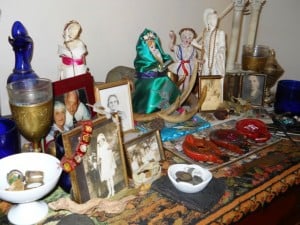Sundays are for sharing crossword clues and reading book reviews in the NY Times, online at NPR, and elsewhere. Yesterday I came upon reviews for Meghan O’Rourke’s The Long Goodbye on her period of mourning the death of her mother. The reviews thought of her posing “the lack of mourning rituals in contemporary American life,” where the only impression I received was that what was lacking was in Ms. O’Rourke herself. She writes about her dark night of the soul, feeling abandoned after the loss of her mother. She displayed her grief in depression, by not washing her hair for days, by letting her housework go undone, as mundane tasks exhausted her in her sudden loneliness. The last lines of the excerpt which was provided to NPR really stated the problem. Her mother was dead and she wanted her back. Meghan was not ready to give up her mother. She found no solace in society’s normal reaction to her situation. That situation was entirely her own making, within herself, for shutting her deceased mother out of her life. Her grief was never about her mother’s suffering and death, but only about herself.
I sympathize with those who suffer, but my attitude towards the dead is quite different apparently from what Meghan experienced. It was regrettable that she had to pass through this, but it is a rite of passage that we all must experience at some point in our lives. That may not be any solace to Meghan O’Rourke on the loss of her mother, but I cannot have much sympathy for those who mourn themselves without any thought to what the dead are experiencing. I am not a stranger to death. The summer of ’69 was a great time, men walking on the moon, Woodstock, the summer of love. And then came 1970. Within that one year’s time, when I was seventeen, three friends died – one on his first day in country in Viet Nam, another for selling one man’s drugs in another man’s territory, and the third, then, in summer, for walking into the wrong neighborhood with the wrong color girlfriend. Then in the fall my first son died, as two more sons would in later years. Then in December of that year my first wife died as well. The following year I entered college, student deferments for the draft were discontinued in the fall, and months later I was off to the wars. Two years after burying my first son, I was at the airport, my daughter was being sent off to live with her grandparents, as I was to fly to Viet Nam. The next years I saw death often, violent, terrible death, to the point of becoming oblivious to it. But also learning much about death. Men do not fall over dead, they crumple to the ground like discarded laundry. There is a certain stench of death when a man is split open, no matter the means. If you are the instrument, cold steel in hand, he gasping for breath as you pierce his lung several times, then the rush of warmth from within as he is sliced open, the gushing bodily fluids from every orifice and wound, the stench mopping up all moisture from your nostril hairs, the light passing from his stare. And there is something else as well that comes forth from the shell of a body. I have been with several people as they have died; some in bed, others in extreme violence, ripped in half, dying slowly or instantly. But only once did my proximity allow me to experience a soul as it came forth, liberated from the tomb that was its body.
The body dissolves, its components retrieved by Nature, while the essence of a person, his Authentic Being, continues on. Whatever others may believe, I know from my experiences, from what I felt and intuited in that moment, and from other events over the years, that the quintessential is within us, that we do live on in some form after death. It is a personal belief that I hold with a certainty. So when it came time, in the last three years of my mother’s life, she consulted me on death and I was fortunately, if not fortunate in being so, experienced enough to help her face her own death. Each time we would meet she would be in some new phase. She was angry. She was accepting. She was fearful. She was despondent. We worked together through her many stages of facing death, and then also what she would experience as death came upon her and her body would shut down.
It was some years earlier when I had been rushed to a hospital while in danger of bleeding to death from an injury. At one point I found myself looking down, floating near the ceiling in a corner of the room, seeing nurses gathered around my bed, fussing franticly over me, and a doctor coming in to take charge. My peripheral vision was gone, my narrowing field of vision in front was circled by a dark, grayish haze. And above me there appeared a tunnel of light, surrounded by whirling dark clouds as though inside a tornado. A presence seemed to be at the end of the tunnel, no vision of a person, though, and no voice, but just a feeling of someone else with me at the other end of that light. And then suddenly it was all gone and I later awoke back in the hospital bed with my wounds packed with bandages. A typical near-death experience in ’68 before people began to name such experiences. I do not believe that near-death experiences really offer any evidence of a life after death. It is, however, an experience that informs us of what shall happen as our brain shuts down for the last time. With our eyelids shut, the light captured on our retinas will still shine into different shades as it fades. The mind shutting down is like that, the tunnel vision, the floating sensation, the dark cone above pierced by a light, are not unlike the initial experiences of entering into a deep trance state. It is natural. It is a biochemical process. Little more. But while your body is passing through the stages of shutting down, there is that other one, the presence, the one observing it all. When all else has left you, you still remain. But you are not alone.
On the last morning of her life, my mother awoke happy and refreshed. No longer did she have any trepidation over her impending death. She had had a vision. Her parents and sister, and all of her deceased family members were there before her, dressed in white, greeting her as they glowed in light, awaiting her, and assuring her that she would be among them. My mother died later that day peaceful and happy. She had learned much from me over those three years to accept, rather than dismiss, what she would experience and how it would unfold for her; and then her parents and family came to assure her that everything would be alright in her passing.
Then came the funeral where a clash of cultures took place. Christian friends of my mother and non-Christian family. First there was the funeral director, chosen I suppose because my mother had known him. But he was obviously not prepared for my family’s ways. He may have been expecting my wife’s family. I have attended a few of their funerals. Bowed heads, whispered condolences, black attire and gray frowns, the same mourning speeches followed by a tearful display that loses all sincerity after a few of these performances. No, Meghan, society does have rituals for mourning. The customary displays in contemporary America certainly are not ones that my family follows. And I would agree with you that they would have little to offer me. I find such open displays of grief to be hollow and unresponsive to what a person in grief needs. The funeral director must see a lot of those performances of grief, and thus he was surprised by our ways. We retired away from the body; filled up the unventilated “smoking area” with smoke, with even non-smokers and children coming in, as we were throwing a party with food, drink, jokes, tall tales and crude stories from my mother’s life. We celebrated her life and death with joy and happiness, smiles and laughter. And why not? Her suffering had ended, her worries behind, she had gone on to the next life, to be with her family, not torn from it. It is a joyous occasion, one that is celebrated each year, and it is not as though she ever left us, as matters were to prove later.
This was not the first time we had had such a clash of cultures. After living many years in the US, my grandfather finally became a citizen. He thought it was therefore time for his family to become Americanized. He saw how his coworkers celebrated Christmas, so he thought he would bring his whole family, their spouses and his grandchildren to celebrate Christmas Eve in this little Catholic church across the river on the west side of Cleveland. We entered the church as a crowd of around thirty people. Inside were only a priest, one boy, and a few worshipers present for a midnight mass. Our crowd set up in the back of the church, opened containers for our meal, playing music and dancing. It was a holiday, a festival, and so we celebrated as we were accustomed to do, much to the shock of the priest and others who only stared with mouths agape. My mother’s funeral director had a similar look of surprise.
Then the next thing to happen at my mother’s funeral was her eulogy. A Christian minister she knew had asked to give one. No one thought much about it, so we had agreed. First he was surprised and upset to find us away from the casket, having left only a couple men guarding her body. The minister found no one who needed consoling from him and he was disturbed to find none of us grieving. The funeral director ushered us back in to hear the minister, and while he tried to don a solemn face as my in-laws might expect, we were laughing and singing and telling lewd jokes and generally catching up with family. The minister began without waiting for us to settle. It his usual sermon for funerals, not realizing it was totally inappropriate for us. Sin and hell and judgment, redemption into I don’t know what. “Is he saying she was a bad person?” Family members started turning around, looking at one another in confusion. Some family members are Catholic and even they were having a problem with the ideas he was spouting in his speech. Basically it came down to his attempt to console us on a loss that we did not feel had happened. Whatever this Christian minister thought mourning should be, it was clear that he was not speaking to us. He tried to convince people that death was not an end, by telling all of us who were anxious to continue our celebration that we should not be sad, should not weep. A collective silent stare burnt into his chest as the crowded room turned angry. Some left, some had to be held back, most returned to our celebration. Everyone deals with death differently. To understand our way, one has to know what we knew to expect in the days that followed.
Even though my mother had died, she had not passed on just yet. My father still felt her presence in their house, still heard her breathing, still heard her speak to him. She appeared in dreams to my sisters at their houses, warning both of them that our father was in danger. She was very specific in where the danger lay, and when checked into the problem was discovered and repaired, and the danger averted. Her presence visited me at my house as well. And she appeared to my youngest son, too, telling him that his ‘mother’ would be alright. That night his godmother had a serious heart attack but recovered. Other family members as well told of hearing from her in the weeks that followed her death; this was only normal to us. She told my father and others that there was something she had to do first, and when she apparently did, she then moved on to the next stage of her new life. There was nothing new or odd about these experiences of her visitations after death since family members had had them before with other deceased relatives. Consulting with our deceased family members is a central feature of our religious tradition. Prayers are daily offered to them with sacrifices at the lararium. And there are annual festivals for the dead through the year. In a meaningful way, we live with our ancestors. In Latin they are called Lares. We knew ours as comminui. We are never alone. We are never departed from our relatives. Sometimes a stray cat or a dog might come by and the aunts would start saying who it might be. Not everyone is ready to move on to higher planes of existence. Many are believed to be reborn into the family, just as the Druse believe, and some are thought to return to the family in other forms, as they might deserve. Only the ones who are truly worthy and prepared to do so go on to become a Lar. But no one ever truly dies. That is what our tradition implies in its practice, and what experience has confirmed for me.
It must be difficult for those like Meghan whose tradition has a different view of life and death, where an emphasis is placed on pain and suffering and punishment for misdeeds in the next life consumes them in this life. It is no wonder that they feel abandoned and alone by the death of a mother when they have been taught that death cuts them off from their loved ones. It is no wonder that their mourning is for themselves, grieving at what they have lost when they know nothing about what they still have. It is not surprising, too, that at their own death they come to fear what awaits them, clinging desperately to life, lest they must suffer for their own misdeeds. When I pray each morning, and every night, it is to my mother and grandparents, and to theirs, and to all my other deceased relatives back to the original matriarch of our gens, to my deceased first wife, to my deceased sons, to friends who died of breast cancer, to the genius of my best friend who died in recent years, to all the comrades I knew, and to so many others. These are my Lares, my lifetime companions. Our long goodbye is not a period of mourning those who passed away from us, nor is it a period of adjustment to being without a loved one in our life. Rather ours is a continual celebration of living among our ancestors. Looking toward my own death, neither fear, nor remorse, nor any regrets accompany my anticipation for the next adventure. It shan’t be a lonely journey with so many waiting to accompany me onward to the Blessed Isles and what waits beyond.
Two of the reviews to which I referred on Meghan O’Rourke’s The Long Goodbye, 2011, may be found at these sites:
NPR review: http://www.npr.org/2011/04/14/135376093/modern-the-long-goodbye-a-syllabus-for-mourning
NYT Book Review: http://www.nytimes.com/2011/04/17/books/review/book-review-the-long-goodbye-by-meghan-orourke.html?_r=1&ref=review











